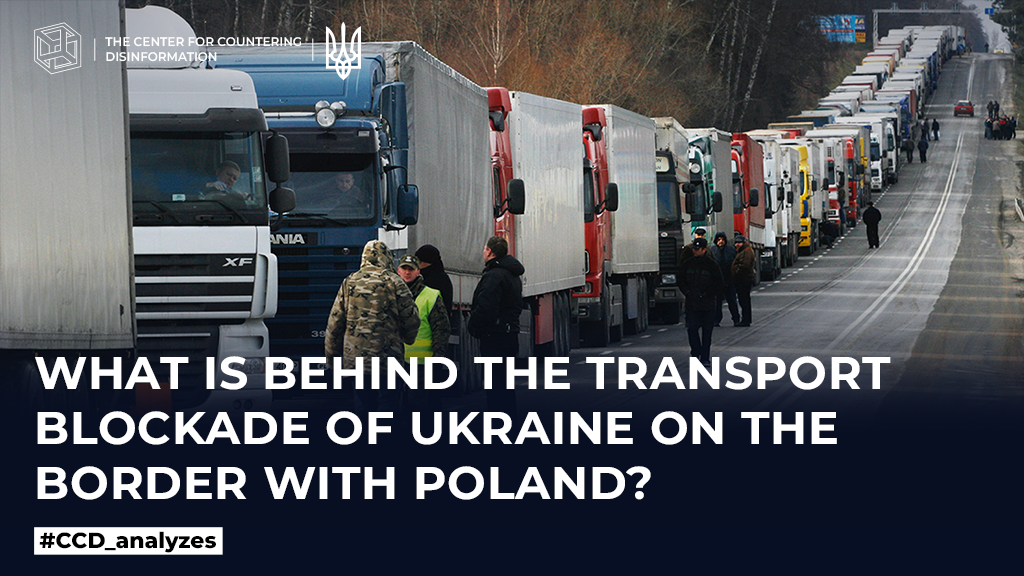On November 6, Polish carriers began physically blocking three of the four largest border crossings on the Polish-Ukrainian border (Korczowa-Krakowiec, Dorohusk-Yahodyn, and Hrebenne-Rawa-Ruska). Although the protesters promised not to interfere with passenger transportation, as well as the import of military and humanitarian supplies to Ukraine, as of November 13, about 1,700 trucks were blocked at the three exit routes from Poland. At the same time, the protesters declared their readiness to keep the blockade for up to two months.
Currently, the Ukrainian Ministry of Infrastructure has not received an official list of the protesters’ demands and has to determine them by analyzing media reports. It is clear that Ukrainian carriers are demanding the return of permits; stricter requirements for transportation under the certificates of the European Conference of Transport Ministers; a ban on registration of companies with capital from outside the EU in Poland; access to the Ukrainian “Shlyakh” system; separate queues for EU cars in the “eQueue” system and separate queues for empty cars.
Thus, in addition to significant losses for Ukrainian carriers and exporters, the risk of disruption of military and humanitarian supplies, the most important consequence of the situation was a certain loss of trust in Poland in Ukraine.
Why did this happen and who is behind the organizers of the transport blockade?
First of all, there is every reason to believe that the protest was organized by certain political forces opposed to the current government in Poland. After all, the protests were initiated by the “Committee for the Protection of Carriers and Employers in the Transport Sector,” which was established in September and includes several owners of Polish companies that participated in previous border blockades. One of the most active participants in the blockade is Rafał Mekler, owner of the logistics company Rafał Mekler TRANSPORT (transports goods to Belarus and russia) and head of the Lublin branch of the Confederation party. This far-right party is known for dreaming of the collapse of the EU, advocating cooperation with russia and opposing the rapprochement between Poland and the United States, recognizing Crimea as russian, and its leader calling the “dpr-lpr” “independent states.” It was the leaders of the Confederation who organized a press conference in the Sejm on November 3 to announce the blockade. It is clear that Polish carriers account for a large share of the EU internal market and are interested in eliminating Ukrainian competitors by simply banning them from operating in the EU. Thus, under the pretext of concern for Polish carriers, the leaders of the “Confederation”, on the one hand, are trying to increase their own political rating, and on the other hand, to destroy voters’ confidence in the “Law and Justice” party of the current President A. Duda.
Second, there is a high probability that russian special services are involved in the action, provoking a split between Ukrainians and Poles. The “russian trace” is evidenced by the fact that only one of the four Polish transport associations whichused to operate in the russian and Belarusian markets is on strike. It is known that Polish transportation companies hire Ukrainian drivers in large numbers for routes to Ukraine. Therefore, if a Ukrainian driver goes to Ukraine behind the wheel of a Polish truck, he will simply not be able to return. On the other hand, the access of Polish transport companies’ to the “Shlyakh” system allows Ukrainian drivers of military age to leave Ukraine freely after registering for a route through Poland. Thus, the kremlin is very much counting on the fact that the fulfillment of this condition, along with the ban on the export of Ukrainian grain, will actually destroy the logistics of supplying military and humanitarian goods to Ukraine through Poland, as well as provoke a disruption of mobilization activities. It is noteworthy that the border paralysis was organized the day before the European Commission’s decision to recommend the start of negotiations on Ukraine’s accession to the EU, after which the Confederation called on the Polish government to block Ukraine’s accession to the EU.
How critical is the situation?
Currently,the Ukrainian side is discussing with the Polish authorities the possibility of unblocking the checkpoints and has already resolved two issues raised by Polish colleagues. These are the functioning of lanes for empty vehicles directly at the Yahodyn-Dorohusk checkpoint and the update of the “eQueue” system’s functionality. On November 13, the relevant Ukrainian officials, together with Polish officials, plan to hold a meeting directly at the border, including with the participants of the blockade, in order to finally end it.
Thus, the situation at the border has several components and affects not only the export of Ukrainian products, but also future interstate relations. However, there is every reason to hope that the negotiations will be successful, because unlike the agrarian and grain protests, this strike is not supported by the majority of carriers or the Polish authorities, but is the result of a conspiracy by a small group of political outsiders who are using the situation for their own purposes.










